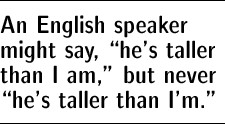
A misguided debate is raging over English grammar. It began when authors Patricia O'Conner and Steward Kellerman claimed in the Smithsonian that "most of what you know about grammar is wrong." Then The Huffington Post picked it up, and after that The Guardian.
The controversy is illustrated by a disagreement over "split infinitives": is it, or is it not, okay to say "to boldly go...," using the word "boldly" to split the infinitive "to go"?
 Having written a column on (Hebrew) grammar for the International Jerusalem Post and with a Ph.D in linguistics to my name, I feel like I have a horse in this race. And as someone who likes talking to my friends, I have another horse in the race. As an author and lover of words, I have a third horse with my name on it.
Having written a column on (Hebrew) grammar for the International Jerusalem Post and with a Ph.D in linguistics to my name, I feel like I have a horse in this race. And as someone who likes talking to my friends, I have another horse in the race. As an author and lover of words, I have a third horse with my name on it.
And this is my point: There are three distinct ways to look at grammar.
Who Died And Made You King?
The first, and most traditional way, is what we linguists call "prescriptive grammar," or, more snarkily, the "who died and made you king" approach. And it's essentially a social policy, not unlike wearing white only after Labor Day. (Or before. Or Memorial Day. You know what I mean.) People in power make up rules and expect other people to follow them: Don't end a sentence with a preposition. Don't split an infinitive. And so on.
But Ms. O'Conner and Mr. Kellerman are misleading when they say that these are "phony rules." They're just like spelling: arbitrary agreements enforced by arbitrary language monarchs. There's no good reason that the possessive "Michael's" should have an apostrophe when the equally possessive "its" does not, for instance, but that's the way it goes. The kings told us so. And the same is true of properly positioning prepositions and not inserting items into infinitives.
(Incidentally, the "with" in "put up with" is a particle, not a preposition, in spite of Churchill's probably apocryphal stance that "ending a sentence with a preposition is something up with which I shall not put." And Ms. O'Conner and Mr. Kellerman are simply wrong when they say that "to" isn't part of the infinitive in English.)
But Everyone's Doing It!
The second way to look is grammar is both more interesting and less appreciated. People naturally follow innate rules when they speak. Unlike the "who died and made you king" sort, which, as we've seen, are a social policy, these innate rules are akin to anthropology. People follow these rules without even knowing that they're doing so. Technically part of "descriptive linguistics," we might dub these rules "but everyone's doing it."
For example, in English, "I am" and "I'm" mean the same thing: "I am going to the movies" is the same as "I'm going to the movies." But even so, an English speaker might say, "he's taller than I am," but never "he's taller than I'm." Hundreds of millions of Americans, Brits, and more all agree on this basic fact, in spite of mostly never having thought about it before. That's the magic of the "but everyone's doing it" camp: it sheds light on human behavior.

Similarly, we're told to say, "it is I," not "it's me." But descriptively that's nonsense. If four people who knock on a door in America are asked "who is it?" they don't answer "it's only we."
As a final example, English speakers innately know that profanity can be used to split a word right in the middle, but only in the correct place. This is why Laura San Giacomo's foul-mouthed character in Pretty Woman can respond to a question about a name with "CindeFuckingRella," and why a frustrated traveler might lament getting stuck in "MissisGodDamnSippi." We know that this curious pattern is governed by rules because only some internal word slots allow expletives: speakers don't say "CinFuckingDerella" or "MississipGodDamnPi."
So when Ms. O'Conner and Mr. Kellerman write that a rule is "phony," what they mean is that it is not descriptive. And they're right that many a non-descriptive rule was promulgated in honor of the regent we call Latin. But even artificial rules are rules, and, like spelling, they have their place.
The Art of Writing
If the first kind of grammar ("who died and made you king") is a social policy, and the second ("but everyone's doing it") is observational science, the third is art: what's the best way to put words together to achieve a certain goal?
If you want clarity, then, for example, "writing carefully, dangling participles must be avoided," to quote William Safire's 1979 column in The New York Times. (The dangling particles aren't writing carefully. The writer is.) An even clearer example is replacing the awkward "sleeping soundly, the lion ate the campers" with the better "the lion ate the sleeping campers." The reason to avoid dangling particles, in other words, is that they're not clear.
Passives, too, generally don't make for good prose. So instead of "the campers were eaten by the lion," a good author will generally prefer "the lion ate the campers."
And I'm reminded of a sign I saw in the restroom in Target: "All employees must wash your hands."
But these rules, some of which are prescriptive, are only aesthetic guidelines. Really good authors know when to break them. This is why the second sentence of Lee Child's run-away best seller The Killing Floor can be the three-word fragment, "At Twleve O'clock." And the second sentence of John Grisham's The Firm can be the ungrammatical, "He had the brains, the ambition, the good looks." (This is technically called "asyndeton." Mr. Grisham's second sentence is asyndetic.) A high-school student would lose points on an essay for writing either of these sentences, but Mr. Child and Mr. Grisham use them to create best sellers.
Deviate too far from the "who died and made you king" rules, and your writing will look ignorant and amateurish. Deviate from the descriptive rules and you're no longer writing English. But deviate from the aesthetic rules, and you end up either with a mess or with a masterpiece.
Art is like that.
J.M. Hoffman authored two non-fiction books and contributed to over a dozen others before writing The Warwick Files, a short-story series featuring a police chief with a secretive past who lives in a quiet New York City suburb where, according to the official count, there are no spies.
He signs his non-fiction work with his full name and title, and his fiction with the shorter "J.M. Hoffman."
Find him on Facebook or at www.JM-Hoffman.com.
